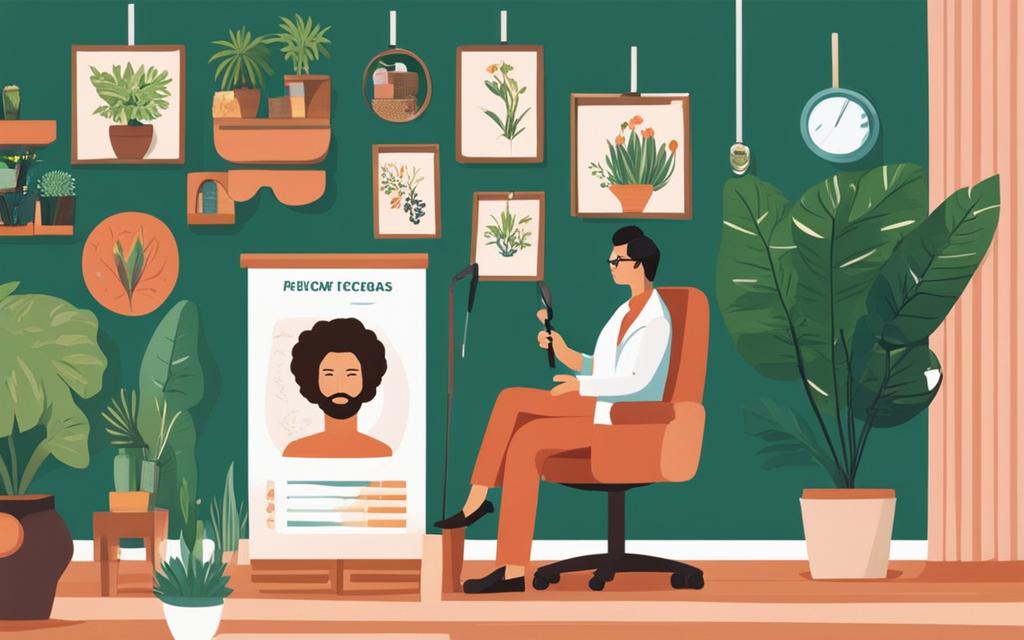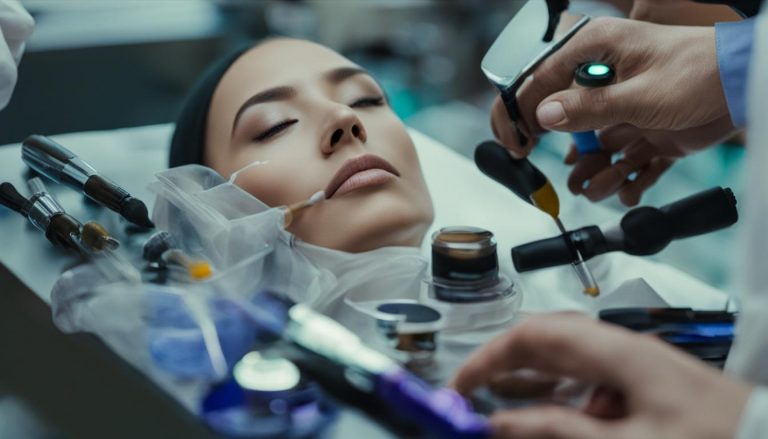What is a Trichologist? – Unveiling the Profession
In the realm of hair and scalp health, there are specialists who possess a unique understanding of the intricacies that lie beneath the strands. They are known as trichologists – professionals dedicated to diagnosing and treating hair and scalp disorders. If you find yourself grappling with excessive hair loss, a flaky or itchy scalp, or other hair-related concerns, seeking the expertise of a trichologist is crucial. They possess the knowledge and skills to unravel the root causes of these issues and provide appropriate treatment solutions.
Trichologists work closely with dermatologists in cases where a biopsy or underlying skin condition is present. This collaboration enables a comprehensive understanding of the individual’s situation, leading to more accurate diagnoses and effective treatment plans. Trichologists are equipped to address a range of concerns, including bald patches or thinning hair, slow hair growth, and changes in hair texture or color.
Signs You May Need to See a Trichologist
If you are experiencing hair and scalp issues, it may be time to consider a trichology consultation. Trichologists are experts in hair and scalp health, and they can analyze your hair and scalp to determine the underlying causes of your concerns. Here are some signs that indicate you may benefit from seeing a trichologist:
- Excessive hair loss: If you notice a significant amount of hair shedding or bald patches, a trichologist can help identify the reasons behind it.
- Flaky or itchy scalp: If you have dandruff or an itchy scalp that doesn’t go away with regular anti-dandruff shampoos, a trichologist can provide targeted treatments.
- Thinning hair: If your hair is becoming noticeably thinner over time, a trichologist can assess the causes and recommend appropriate solutions.
- Slow hair growth: If your hair seems to be growing at a sluggish rate or has stopped growing altogether, a trichologist can help stimulate hair growth.
- Changes in hair texture or color: If you have noticed drastic changes in your hair’s texture or color without any apparent cause, a trichologist can investigate the issue further.
A trichologist consultation involves a detailed analysis of your hair and scalp health. During the consultation, the trichologist will examine your scalp, check for any signs of inflammation or infection, and assess the overall condition of your hair. They will also take into account your medical history, lifestyle factors, and any medications you may be taking. Based on their findings, they will create a personalized treatment plan to address your specific concerns and promote hair and scalp health.
Remember, seeking professional help from a trichologist is essential for accurate diagnosis and tailored treatment solutions. If you are experiencing any signs of hair and scalp issues, don’t hesitate to schedule a trichology consultation. Taking proactive steps to address these concerns can help restore your hair’s health and confidence.
Table: Common Signs and Symptoms Requiring Trichologist Consultation
| Symptom | Possible Underlying Causes |
|---|---|
| Excessive hair loss | Hormonal imbalances, nutritional deficiencies, stress, genetics |
| Flaky or itchy scalp | Dandruff, scalp psoriasis, folliculitis, fungal infection |
| Bald patches or thinning hair | Alopecia areata, traction alopecia, hormonal imbalances |
| Slow hair growth | Underlying health conditions, nutrient deficiencies, hormonal imbalances |
| Changes in hair texture or color | Chemical damage, hormonal changes, nutritional deficiencies |
The Role of a Trichologist in Treating Hair Loss
A trichologist plays a crucial role in addressing hair loss and promoting hair and scalp health. With their specialized knowledge and expertise, they can identify the underlying causes of hair loss and recommend appropriate treatment solutions. Through comprehensive diagnostic tests and examinations, trichologists can determine if hormonal changes, stress, poor nutrition, medication, or other factors are contributing to the hair loss.
“Trichologists are trained to understand the various hair and scalp disorders and their treatments,” says Dr. Jane Smith, a renowned trichologist. “They work closely with their clients, developing personalized treatment plans and guiding them through the journey to achieve optimal hair growth.”
Based on their findings, trichologists offer a range of hair growth solutions tailored to individual needs. These may include topical creams, steroid injections, immunotherapy, dietary changes, and supplements. Trichologists also provide advice on maintaining a healthy scalp, as the condition of the scalp ultimately affects the growth and quality of the hair.
The Benefits of Trichology Services
- Expert Diagnosis: Trichologists are trained to identify the root cause of hair loss and scalp disorders, enabling them to provide accurate diagnoses and targeted treatments.
- Personalized Treatment Plans: Trichologists develop individualized treatment plans based on the client’s specific needs and goals, ensuring the best possible outcomes.
- Comprehensive Care: Trichologists offer ongoing support throughout the treatment process, monitoring progress and adjusting the treatment plan as necessary.
- Long-Term Results: By addressing the underlying causes of hair loss and promoting scalp health, trichologists can help clients achieve sustainable hair growth and maintain optimal hair and scalp condition.
Overall, the role of a trichologist in treating hair loss is to provide expert diagnosis, personalized treatment plans, and comprehensive care. With their specialized knowledge and dedication to promoting hair and scalp health, trichologists play a vital role in helping individuals regain confidence and achieve optimal hair growth.
| Treatment Options | Description |
|---|---|
| Topical Creams | Applied directly to the scalp to promote hair growth and inhibit hair loss. |
| Steroid Injections | Injected into the scalp to reduce inflammation and stimulate hair growth. |
| Immunotherapy | A treatment that uses chemicals to trigger an allergic reaction in the scalp, stimulating hair growth. |
| Dietary Changes | Recommendations for a balanced diet rich in vitamins and minerals that support hair health. |
| Supplements | Oral supplements containing vitamins, minerals, and other nutrients that promote hair growth. |
The Science Behind Trichology
Trichology, the scientific study of hair health and beauty, plays a fundamental role in understanding and addressing hair and scalp conditions. By enrolling in a trichology course, you can gain in-depth knowledge and practical skills to excel in this specialized field. Whether you choose to pursue a trichology course online or on-campus, these comprehensive programs cover various aspects of hair anatomy, scalp disorders, treatments, and styling techniques.
A trichology course provides a deep understanding of the structure, function, and diseases of the human hair and scalp. Through theoretical lessons and hands-on training, you will learn to analyze different hair and scalp conditions, diagnose underlying causes, and develop tailored treatment plans. From hair loss to scalp disorders, a trichology course equips you with the expertise to address diverse issues effectively.
“Trichology courses are designed to provide a comprehensive understanding of hair health and beauty. By enrolling in a reputable trichology course, you can develop the skills and knowledge needed to succeed in this specialized profession.” – Trichology Expert
| Course Benefits | Course Format | Duration |
|---|---|---|
|
|
|
By completing a trichology course and gaining certification, you can embark on a rewarding career as a trichologist. Armed with specialized knowledge and skills, you can provide expert consultations and treatments, helping individuals achieve optimal hair and scalp health. Whether you aspire to establish your own trichology clinic or join existing hair loss centers, becoming a certified trichologist opens up a world of opportunities to make a positive impact in the lives of those struggling with hair and scalp disorders.
Invest in your future by enrolling in a trichology course today. Expand your knowledge, refine your skills, and become an authority in the field of trichology. Explore reputable trichology courses such as the one offered by London School of Professional Development for a comprehensive and engaging learning experience.
Becoming a Certified Trichologist
If you’re passionate about hair and scalp health and want to make a difference in people’s lives, becoming a certified trichologist could be the perfect career choice for you. As a trichologist, you’ll become a hair and scalp specialist, offering expert consultations and treatments in a trichology clinic. But how do you embark on this fulfilling journey? Let’s explore the steps to becoming a certified trichologist:
1. Complete a Reputable Trichology Course
To become a certified trichologist, it’s crucial to enroll in a reputable trichology course. Look for courses that are recognized and accredited by industry professionals. These courses typically require an active state license in cosmetology or barbering, ensuring that you have a solid foundation in haircare. By completing a comprehensive trichology course, you’ll gain the necessary knowledge and skills to excel in this specialized field.
2. Obtain the Required License and Accreditation
Before you can practice as a trichologist, it’s essential to obtain the required license and accreditation. This typically involves fulfilling the educational requirements of your state, passing any necessary exams, and ensuring that you meet the criteria set by professional trichology associations. Obtaining the right credentials will not only demonstrate your expertise but also help you establish trust with clients and colleagues.
3. Gain Practical Experience
While theoretical knowledge is important, gaining practical experience is equally crucial in becoming a successful trichologist. Seek opportunities to work under experienced trichologists or join trichology clinics where you can apply your skills in real-life scenarios. This hands-on experience will enhance your understanding of different hair and scalp conditions and enable you to develop effective treatment strategies.
4. Stay Updated with Continuing Education
The field of trichology is constantly evolving, with new research and advancements being made regularly. As a certified trichologist, it’s essential to stay updated with the latest developments in the field. Attend conferences, workshops, and seminars to expand your knowledge and keep up with emerging trends. Continuing education will not only enhance your skills but also ensure that you provide the best possible care to your clients.
By following these steps, you can become a certified trichologist and make a positive impact on the lives of people struggling with hair and scalp issues. Your expertise and specialized knowledge will help individuals achieve optimal hair and scalp health, boosting their confidence and well-being.

The Benefits of Being a Trichologist
Being a trichologist opens up a world of opportunities as you become a specialist in hair and scalp health. As a hair and scalp specialist, you have the knowledge and expertise to revolutionize the lives of clients who struggle with hair and scalp disorders. By providing tailored hair growth solutions, you can help individuals regain their confidence and self-esteem.
One of the unique benefits of being a trichologist is the ability to enhance your career prospects. With specialized knowledge in hair loss treatment, you can join existing hair loss clinics or even establish your own practice. Building a reputation as an authority in the field will not only attract a loyal client base but also open doors to new professional opportunities.
Furthermore, being a trichologist allows you to make a meaningful difference in the lives of others. You have the power to address conditions like alopecia and help individuals overcome the challenges associated with hair loss. By offering trichology services, you can guide clients through their hair growth journey, providing support and effective solutions along the way.
Unlocking Opportunities in the Field
Trichology is a fast-growing industry with increasing demand for qualified professionals. By becoming a trichologist, you position yourself as a valuable asset in the beauty and wellness sector. The skills and expertise gained through a trichology course allow you to stand out from the competition and establish yourself as a trusted practitioner.
| Benefits of Being a Trichologist |
|---|
| Revolutionize the lives of clients with hair and scalp disorders |
| Enhance career prospects and professional opportunities |
| Make a meaningful difference in the lives of others |
| Unlock opportunities in the fast-growing trichology industry |
Choosing the Right Trichology Course
When it comes to pursuing a career in trichology, choosing the right course is crucial. The proper training and education will equip you with the skills and knowledge needed to excel in this specialized field. Here are some factors to consider when selecting a trichology course:
- Curriculum: Look for a course that offers a comprehensive curriculum covering essential topics such as hair anatomy, scalp disorders, diagnosis techniques, and treatment options. A well-rounded curriculum will provide you with a solid foundation in trichology.
- Practical Training: Practical training is essential in trichology. Ensure that the course you choose includes hands-on experience in hair and scalp analysis, diagnosis, and treatment. Practical training will give you the confidence and skills required to work with clients effectively.
- Institution Reputation: Research the reputation of the institution offering the trichology course. Look for reviews and testimonials from previous students to gauge the quality of education provided. A reputable institution will have experienced instructors and a track record of producing successful trichologists.
By considering these factors, you can make an informed decision and choose a trichology course that aligns with your career goals. Embarking on the right trichology course will set you on the path to becoming a skilled professional in the field of hair and scalp health.
| Course | Curriculum | Practical Training | Institution Reputation |
|---|---|---|---|
| Course A | Comprehensive | Hands-on experience provided | Excellent reputation |
| Course B | Limited coverage | Limited practical training | Mixed reputation |
| Course C | Extensive coverage | Extensive practical training | Highly regarded |
“Choosing the right trichology course is the first step towards a successful career in the field. The curriculum, practical training, and reputation of the institution play vital roles in shaping your knowledge and skills. Don’t rush the decision; take the time to research and find the course that best suits your aspirations.”
Conclusion
Trichology is a specialized profession that focuses on diagnosing and treating hair and scalp conditions. By seeking help from a trichologist, you can address issues such as excessive hair loss, scalp disorders, and slow hair growth. Trichologists play a crucial role in promoting healthy hair and scalp.
Whether you choose to become a certified trichologist or seek trichology services, you can benefit from specialized knowledge and treatment solutions that contribute to overall hair and scalp health. Trichology courses, like the one offered by London School of Professional Development, provide comprehensive training in understanding hair and scalp health. This course equips you with the knowledge and skills needed to excel in the field of trichology and help others achieve optimal hair and scalp health.
So, whether you’re passionate about helping individuals regain confidence or you’re looking to enhance your career prospects, exploring the world of trichology and enrolling in a trichologist course can be a rewarding choice. Take the first step towards becoming a trichologist and making a positive impact on hair and scalp health.
FAQ
What is a trichologist?
A trichologist is a specialist who diagnoses and treats hair and scalp conditions.
What signs indicate the need to see a trichologist?
Signs that may indicate the need to see a trichologist include excessive hair loss, flaky or itchy scalp, bald patches or thinning hair, slow hair growth, and changes in hair texture or color.
What role does a trichologist play in treating hair loss?
Trichologists can identify the underlying causes of hair loss through diagnostic tests and examinations, and recommend appropriate hair growth solutions such as topical creams, steroid injections, immunotherapy, dietary changes, and supplements.
What is the science behind trichology?
Trichology is the scientific study of hair health and beauty. Trichology courses provide comprehensive training on hair anatomy, scalp disorders, treatments, and styling techniques.
How can I become a certified trichologist?
To become a certified trichologist, individuals need to complete a reputable trichology course and obtain an active state license in cosmetology or barbering.
What are the benefits of being a trichologist?
Trichologists have the opportunity to revolutionize the lives of clients by providing solutions for hair and scalp disorders and enhancing their career prospects in the beauty industry.
How do I choose the right trichology course?
When choosing a trichology course, it’s important to consider factors such as the curriculum, practical training, and the reputation of the institution.







